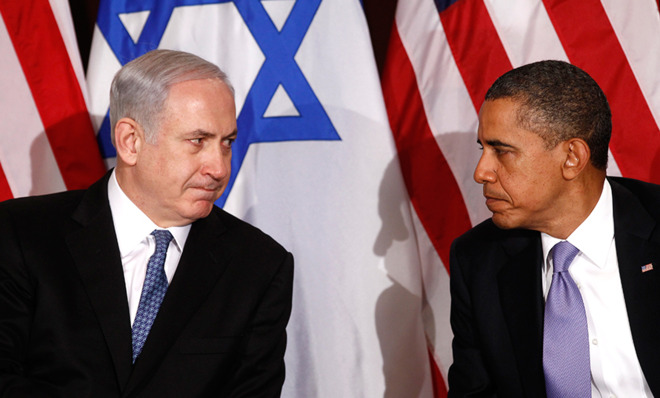What the growing U.S.-Israel crisis really means
The Obama administration has finally gotten the message: This Israeli government is not a partner for peace

A free daily email with the biggest news stories of the day – and the best features from TheWeek.com
You are now subscribed
Your newsletter sign-up was successful
President Obama might take his time deciding who his adversaries are, but eventually he gets there. This was the case with Republicans in Congress. It was the case with Iran and Russia. And it appears, finally, to be the case with Israeli Prime Minister Benjamin Netanyahu.
In a recent piece by The Atlantic's Jeffrey Goldberg, anonymous administration staffers leveled a series of insults at the Israeli prime minister, with "chickenshit" being the most talked about.
Such remarks are inappropriate, not because they are undeserved, but because they belittle the U.S. (Are anonymous petty insults really how a great power should respond to uncooperative client states?) More importantly, they also distract from the very real and legitimate issues the U.S. has had with Netanyahu's behavior over the past five years.
The Week
Escape your echo chamber. Get the facts behind the news, plus analysis from multiple perspectives.

Sign up for The Week's Free Newsletters
From our morning news briefing to a weekly Good News Newsletter, get the best of The Week delivered directly to your inbox.
From our morning news briefing to a weekly Good News Newsletter, get the best of The Week delivered directly to your inbox.
From the first days of Obama's Middle East peacemaking initiative, when the administration called on Israel to meet its previous commitments to freeze settlements, Netanyahu refused and his conservative American supporters mobilized to frustrate the president's agenda. They first hit Obama on Israeli-Palestinian talks and, later, on the nuclear deal with Iran.
To be sure, Netanyahu's recalcitrance was partly determined by political constraints. He leads a governing coalition that includes parties explicitly opposed to a Palestinian state.
But it's also ideological. Throughout his political career, Netanyahu has been a strident opponent of a Palestinian state. That's why his 2009 acceptance of the two-state solution, though heavily caveated, was seen as important. But recent statements by both Netanyahu and key members of his government have indicated that even that highly attenuated acceptance was less than met the eye.
First there were Netanyahu's remarks during the early days of the Gaza conflict this summer, in which he insisted, "[T]here cannot be a situation, under any agreement, in which we relinquish security control of the territory west of the River Jordan." As Israeli journalist David Horovitz observed, "That sentence, quite simply, spells the end [of] the notion of Netanyahu consenting to the establishment of a Palestinian state."
A free daily email with the biggest news stories of the day – and the best features from TheWeek.com
In case that weren't clear enough, in an interview in mid-October, Defense Minister Moshe Yaalon stated his view that the Palestinians should not have a state, only "autonomy" under a permanent Israeli occupation of the West Bank.
The comments given to Goldberg indicate that the Obama administration has finally gotten the message: This Israeli government is not a partner for peace. The implications of this could be significant.
First, what it doesn't mean: Any significant downgrading of the U.S.-Israel relationship itself.
While Goldberg's piece may reveal a new level of animosity between the administrations, it's also important not to overstate the extent of the "crisis" between the two countries. The deep security relationship continues. The consultations on an Iran nuclear agreement are ongoing. Israel remains the single biggest recipient of American foreign aid.
This, of course, has not stopped the usual chorus of conservative ultra-pro-Israel hawks from claiming the president is out to get Israel, a refrain that began the moment Obama announced his candidacy and hasn't abated since. The Weekly Standard's Lee Smith's assertion that Obama has declared "cold war" on Israel is obviously ridiculous on its face, but typical of the genre. (Do note how few, if any, of the hawks have ever had an unkind word to say about the Netanyahu government's near-constant stream of insults against the U.S. president and his team.)
What it does mean, as Goldberg notes in his piece, is that the U.S. might be less energetic about providing diplomatic cover for Israel in various international venues, especially as the Palestinians consider a new strategy to put pressure on Israel in organizations like the United Nations, possibly through another resolution condemning settlement activities, and the International Criminal Court.
In the past, the U.S. worked hard to block these moves on the premise that they undermined bilateral Palestinian-Israeli efforts to resolve the conflict. With the Israeli government now uninterested in any such efforts, that argument no longer works.
With a number of regional crises demanding its attention and energies, the Obama administration may not want to continue to expend valuable diplomatic capital on protecting Israel from the consequences of its government's own bad choices.
And that's entirely appropriate.
Matthew Duss is president of the Foundation for Middle East Peace, based in Washington, DC.
-
 Why is the Trump administration talking about ‘Western civilization’?
Why is the Trump administration talking about ‘Western civilization’?Talking Points Rubio says Europe, US bonded by religion and ancestry
-
 Quentin Deranque: a student’s death energizes the French far right
Quentin Deranque: a student’s death energizes the French far rightIN THE SPOTLIGHT Reactions to the violent killing of an ultraconservative activist offer a glimpse at the culture wars roiling France ahead of next year’s elections
-
 Secured vs. unsecured loans: how do they differ and which is better?
Secured vs. unsecured loans: how do they differ and which is better?the explainer They are distinguished by the level of risk and the inclusion of collateral